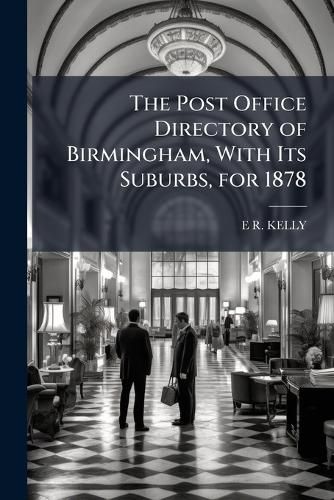Readings Newsletter
Become a Readings Member to make your shopping experience even easier.
Sign in or sign up for free!
You’re not far away from qualifying for FREE standard shipping within Australia
You’ve qualified for FREE standard shipping within Australia
The cart is loading…






A detailed snapshot of Birmingham and its suburbs in 1878, "The Post Office Directory of Birmingham" offers a fascinating glimpse into the commercial and social landscape of a burgeoning industrial city during the Victorian era. Compiled by E. R. Kelly, this directory provides an exhaustive listing of businesses, trades, and residents, making it an invaluable resource for historians, genealogists, and anyone interested in the history of Birmingham.
Beyond its practical function as a directory, the book serves as a rich historical document, revealing the economic activities, social structures, and geographical layout of Birmingham at a pivotal moment in its development. Explore the streets and businesses of a bygone era with this meticulously compiled directory, a vital resource for understanding the city's past.
This work has been selected by scholars as being culturally important, and is part of the knowledge base of civilization as we know it. This work was reproduced from the original artifact, and remains as true to the original work as possible. Therefore, you will see the original copyright references, library stamps (as most of these works have been housed in our most important libraries around the world), and other notations in the work.
This work is in the public domain in the United States of America, and possibly other nations. Within the United States, you may freely copy and distribute this work, as no entity (individual or corporate) has a copyright on the body of the work.
As a reproduction of a historical artifact, this work may contain missing or blurred pages, poor pictures, errant marks, etc. Scholars believe, and we concur, that this work is important enough to be preserved, reproduced, and made generally available to the public. We appreciate your support of the preservation process, and thank you for being an important part of keeping this knowledge alive and relevant.
$9.00 standard shipping within Australia
FREE standard shipping within Australia for orders over $100.00
Express & International shipping calculated at checkout
Stock availability can be subject to change without notice. We recommend calling the shop or contacting our online team to check availability of low stock items. Please see our Shopping Online page for more details.
A detailed snapshot of Birmingham and its suburbs in 1878, "The Post Office Directory of Birmingham" offers a fascinating glimpse into the commercial and social landscape of a burgeoning industrial city during the Victorian era. Compiled by E. R. Kelly, this directory provides an exhaustive listing of businesses, trades, and residents, making it an invaluable resource for historians, genealogists, and anyone interested in the history of Birmingham.
Beyond its practical function as a directory, the book serves as a rich historical document, revealing the economic activities, social structures, and geographical layout of Birmingham at a pivotal moment in its development. Explore the streets and businesses of a bygone era with this meticulously compiled directory, a vital resource for understanding the city's past.
This work has been selected by scholars as being culturally important, and is part of the knowledge base of civilization as we know it. This work was reproduced from the original artifact, and remains as true to the original work as possible. Therefore, you will see the original copyright references, library stamps (as most of these works have been housed in our most important libraries around the world), and other notations in the work.
This work is in the public domain in the United States of America, and possibly other nations. Within the United States, you may freely copy and distribute this work, as no entity (individual or corporate) has a copyright on the body of the work.
As a reproduction of a historical artifact, this work may contain missing or blurred pages, poor pictures, errant marks, etc. Scholars believe, and we concur, that this work is important enough to be preserved, reproduced, and made generally available to the public. We appreciate your support of the preservation process, and thank you for being an important part of keeping this knowledge alive and relevant.